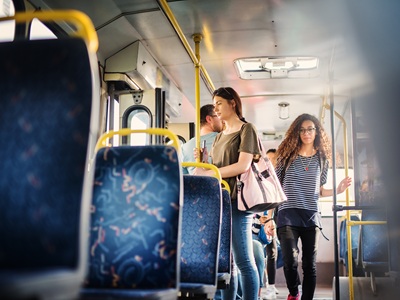Rural bus services recommendations to be discussed by Cabinet
28 Oct 2025

The importance of rural bus services to combating social exclusion, economic stagnation, and in ensuring people can get to hospital and other medical appointments will be discussed by West Suffolk Council’s Cabinet next week.
Although West Suffolk Council is not responsible for public transport, its councillors have been looking at what can be done to encourage more use of buses and ensure residents who don’t have access to a car – just under 15 per cent of households in West Suffolk – aren’t left isolated and excluded as a result. The review came about after a call for action by rural communities and their councillors at the council’s Overview and Scrutiny Committee in December 2024.
Nationally, the think tank Common Wealth reports close to a fifth of workers say they have had to turn down a job due to poor quality bus services.
In West Suffolk more than 40,000 residents (23 per cent of households across the district) are at risk of transport related social exclusion which can impact not only people’s wellbeing and participation in activities but also makes it more of a challenge for young people getting to school or college.
Against the backdrop of all of this, bus passenger numbers in Suffolk overall actually increased in 2024/25, rising by 3.75 per cent – this is in stark contrast to falling numbers elsewhere and the overall trend nationally, but masks the underlying transport challenges of living in rural Suffolk.
On Tuesday, a Steering Group made up of councillors from across the political divide, will make a series of recommendations to West Suffolk Council’s Cabinet.
Some of the recommendations including the lobbying role of the council including the suggestion that all councillors act as Change Champions pushing for better local transport for their communities. Working with the incoming Mayor for Norfolk and Suffolk next year will also be crucial.
At the same time, Cabinet will hear suggestions for the £30,000 of capital it has already set aside for the review from the money allocated to it under the Rural England Prosperity Fund to support improvements to bus infrastructure outside of Bury St Edmunds. This extra local funding from West Suffolk is to complement £2.8m awarded to Suffolk County Council from government in the summer for delivering new or enhanced bus services and bus infrastructure. Community transport schemes are also already able to apply to the council’s Thriving Communities Fund annual grant scheme.
Under the recommendations, West Suffolk would also work with its partners to look at how, under its local planning authority role, it can use funding secured from developers more flexibly to support bus services, including the potential for pooling money into a transport mitigation fund.
Cllr Indy Wijenayaka, Cabinet Member for Growth who set up the steering group after the initial scrutiny investigation, said: “The impact felt by our communities from a lack of rural bus services is huge. It means the risk of social exclusion, isolation and it’s damaging for the UK economy as well.
“While West Suffolk as a district council does not have the funding or the legal power and responsibility to start subsidising rural bus services, we must do all that we can to help improve the situation for our residents.
“That’s why we set up the steering group with councillors from different areas and political viewpoints. It has been very constructive, and I look forward to discussing the recommendations with my Cabinet colleagues.
“Alongside this we welcome the Bus Services Act becoming law this week, as a measure to improve and protect bus services.
“Locally, I’d like to praise the work by rural communities, in campaigning both to protect and promote bus services in their area.”
One example of this is the Bardwell Support Our Buses Taskforce which won its bid for county council funding to save two key bus routes connecting several villages between Diss to Bury St Edmunds, the 73 and 73A.
Chair of the Bardwell Support Our Buses Taskforce, Cllr Karen Witton, said: “The continuation of this rural bus service has been a lifeline for the affected villages and has allowed people to stay connected. The challenge now is to ensure longevity of the service, encouraging people to use the service as much as they can to ensure the financial viability of the service.”
Posted in categories: press release, news
